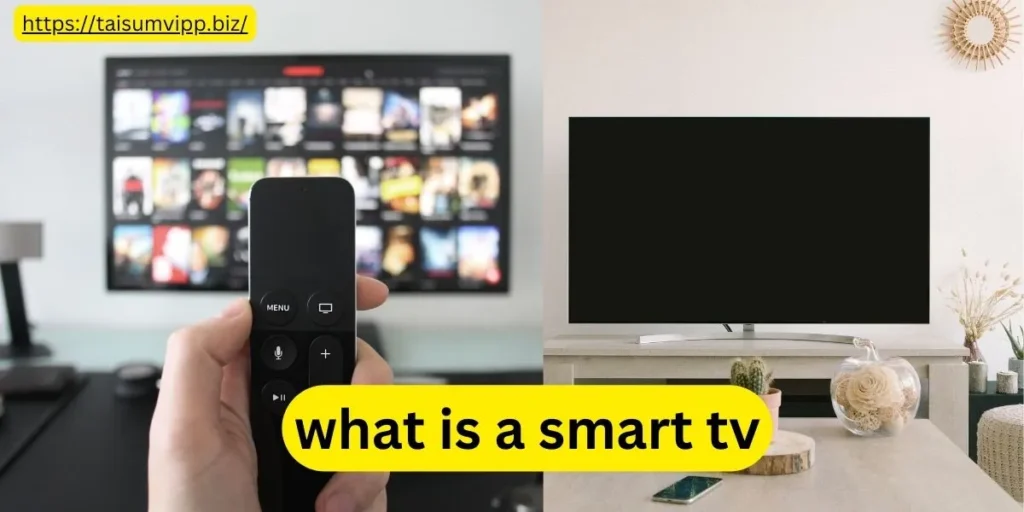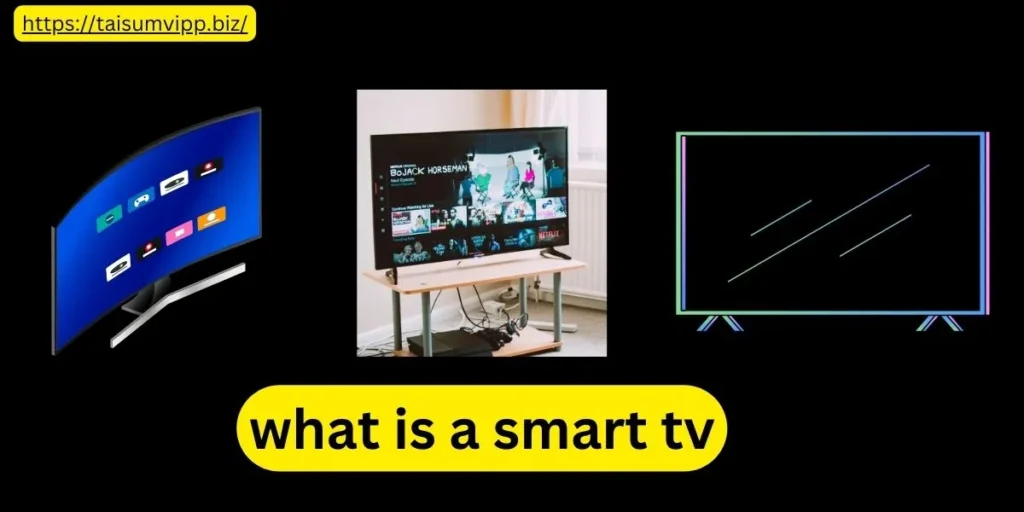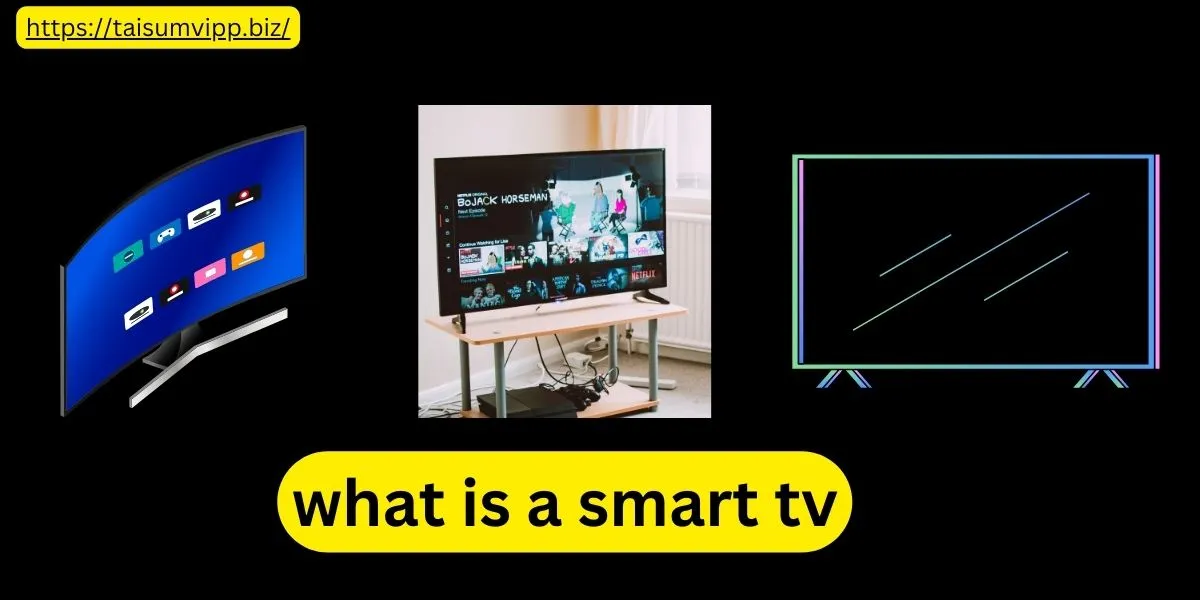what is a smart tv
Discover what a smart TV is and how it enhances your viewing experience in today’s connected world. In today’s digital age, technology continues to evolve, making our lives more convenient and connected. One such technological innovation is the smart TV. If you’ve ever wondered what a smart TV is and how it differs from a regular TV, you’re in the right place. In this article, we’ll explore the features, benefits, and potential downsides of owning a smart TV.
What is a smart TV?
A smart TV, also known as a connected TV, is a television that has integrated internet capabilities. Unlike traditional TVs, smart TVs allow you to access a variety of online content directly from your TV screen. With a smart TV, you can stream movies and TV shows, browse the internet, access social media platforms, and even download apps.

Smart TVs come equipped with built-in Wi-Fi or Ethernet ports, enabling connectivity to your home network. This connection opens up a whole new world of entertainment and convenience, right at your fingertips.
One of the key features of a smart TV is its ability to provide personalized recommendations based on your viewing habits. By analyzing the content you watch, smart TVs can suggest new shows or movies that you might enjoy, creating a more tailored viewing experience.
Additionally, many smart TVs offer voice control capabilities, allowing you to operate your television using voice commands. This hands-free approach to navigation can make it easier to search for content, adjust settings, or even control smart home devices, all without needing to pick up a remote.
What does a smart TV do?
Smart TVs offer a wide range of features and functions that enhance your viewing experience. Besides the ability to access online content, smart TVs often come with pre-installed apps and streaming services. Whether you’re a fan of Netflix, Amazon Prime Video, Hulu, or YouTube, you can easily access these platforms without the need for additional devices.
Additionally, smart TVs may offer voice control capabilities, allowing you to operate the TV using voice commands. This feature eliminates the need to locate the remote control or navigate through complex menus. By simply using your voice, you can adjust the volume, change channels, or search for specific content.
Moreover, modern smart TVs are equipped with advanced display technologies such as OLED (Organic Light-Emitting Diode) or QLED (Quantum Dot LED) panels. These technologies provide stunning picture quality with vibrant colors, deep blacks, and high contrast ratios. The result is a more immersive viewing experience that brings your favorite movies, shows, and games to life.
Another key feature of smart TVs is their connectivity options. Most smart TVs come with multiple HDMI ports, USB ports, and built-in Wi-Fi capabilities. This allows you to easily connect external devices like gaming consoles, Blu-ray players, soundbars, and streaming devices. With seamless connectivity, you can enjoy a hassle-free setup and effortlessly switch between different sources of entertainment.
What does a smart TV cost?
When it comes to the cost of a smart TV, prices can vary depending on factors such as brand, size, and features. Entry-level smart TVs can be found for as low as $200, while high-end models with larger screens and advanced features can cost upwards of several thousand dollars.
While the initial cost may be higher compared to a regular TV, the added functionality and convenience of a smart TV make it a worthwhile investment for many households.
Are smart TVs more expensive?
As mentioned earlier, smart TVs can be more expensive than regular TVs. This is primarily due to the additional technology and features that come built-in. However, the price difference may not necessarily break the bank, and the long-term benefits make it a sensible choice for many consumers.
When considering the purchase of a smart TV, it’s essential to evaluate your needs and budget. If online streaming, app accessibility, and internet connectivity are crucial to you, the extra cost of a smart TV is well worth it.
Smart TVs consume more data
Using online services and streaming content on a smart TV requires an internet connection, which means data consumption is inevitable. If you have a limited monthly data plan, it’s essential to monitor your usage to avoid any unexpected charges.
Streaming high-definition content, such as movies or TV shows, can consume a significant amount of data. However, many smart TVs offer settings to adjust video quality, allowing you to optimize data usage without compromising your viewing experience.
What is a smart TV good for?
There are several advantages to owning a smart TV. Firstly, the ability to access streaming services allows you to watch your favorite movies and TV shows without the need for additional devices. With a smart TV, you can enjoy entertainment without the hassle of connecting a separate streaming media player.
Moreover, smart TVs enhance convenience by eliminating the need for cables or dongles. With built-in Wi-Fi, you can seamlessly connect to your home network and access online content wirelessly. This simplicity and ease of use make smart TVs an attractive option for tech-savvy individuals and those seeking a clutter-free entertainment setup.
What is the best smart TV to buy?
Choosing the best smart TV can be a subjective decision, as it depends on individual preferences and requirements. Factors to consider include screen size, picture quality, audio features, and available apps.
Some popular smart TV brands known for their quality and extensive features include Samsung, LG, Sony, and TCL. Researching and comparing different models within your budget can help you find the best smart TV that meets your needs.
What is a smart TV UK?
In the United Kingdom, a smart TV refers to the same concept as in other regions. It is a television with internet connectivity and built-in features that allow you to access online content, stream media, and utilize various apps.
Smart TVs are widely available in the UK market, offering consumers the ability to stay connected and entertained, all from the comfort of their living rooms.
What is the difference between a smart TV and a regular TV?
The main difference between a smart TV and a regular TV lies in the internet connectivity and additional features offered by smart TVs. While a regular TV allows you to connect other devices, such as gaming consoles or streaming devices, a smart TV eliminates the need for these external devices by providing the same functionality built-in.
A smart TV offers direct access to online content, streaming services, and apps, eliminating the need for additional cables or equipment. It provides a more streamlined and integrated viewing experience.
What is the downside of a smart TV?
While smart TVs offer a multitude of benefits, there are a few potential downsides to consider. Firstly, the initial cost of a smart TV can be higher compared to a regular TV. Additionally, as technology advances rapidly, the software and apps on older smart TVs may become outdated and no longer receive updates.
Furthermore, as with any connected device, there are potential security and privacy risks associated with using a smart TV. It’s crucial to stay vigilant and take necessary precautions when connecting your TV to the internet.
Can we use a smart TV without internet?
Yes, you can use a smart TV without an internet connection, but you will not be able to access its smart features. Without an internet connection, a smart TV essentially functions as a regular TV, allowing you to watch cable or terrestrial channels. However, the ability to stream online content, download apps, and access other online services requires an active internet connection.
If you plan to use a smart TV without internet, ensure you have other devices, such as a cable box or DVD player, to fulfill your entertainment needs.
Can I use my smart TV as a regular TV?
Absolutely! When you’re not utilizing the smart features of your TV, you can certainly use it as a regular TV. Simply connect your desired devices, such as gaming consoles or cable boxes, and enjoy traditional broadcasted content.
Smart TVs are designed to provide a versatile viewing experience, catering to both those who enjoy online content and those who prefer traditional television broadcasts.
Do I need a coaxial cable for a smart TV?
Depending on the type of signal you wish to receive, you may or may not need a coaxial cable for your smart TV. If you plan to watch over-the-air broadcast channels using an antenna, a coaxial cable is required to connect the antenna to your TV.
However, if you primarily intend to use your smart TV for online streaming and accessing content via internet-based services, a coaxial cable is not necessary. The internet connection can be established using Wi-Fi or an Ethernet cable.

Conclusion
In conclusion, a smart TV offers an exciting array of features that extend beyond the capabilities of a regular TV. With internet connectivity, built-in apps, and streaming services, it brings entertainment and convenience to a whole new level. While there may be a slight cost difference and data considerations to keep in mind, the benefits of owning a smart TV make it an appealing choice for tech enthusiasts and those seeking a more integrated and connected viewing experience.
Whether you’re enjoying your favorite shows on Netflix, using voice commands to control your TV, or accessing online content effortlessly, a smart TV brings the future of entertainment right into your living room.

